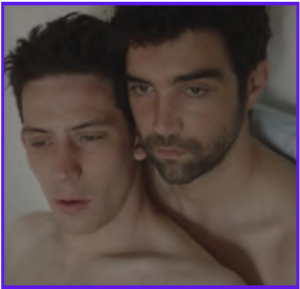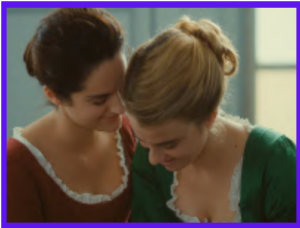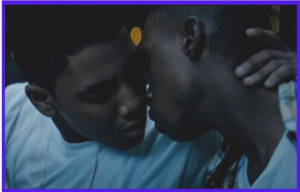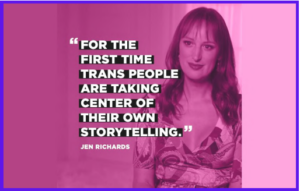FOCUS
#06
Happily Ever After For All? The Importance of Diversifying LGBTQ+ Storytelling.
This focus was written in collaboration with Manon Ardisson, a producer at Ardimages UK, a production company for film and television based in London. They partner with the Observatory of Images – an organization committed to developing projects that defy norms and contribute to change through entertainment.
Overview: Over the past 20 years, there has been a growing interest in representing LGBT identities in cinema and the audiovisual industry. However, with representation, the quality and diversity of these characters are at stake. Facing stereotypes continuously perpetrated in the media, more and more directors and producers have dedicated themselves to offering authentic LGBTQ+ characters. However, this effort requires the support from directors and producers who are committed to developing more diverse stories.
God’s Own Country (2017), by Francis Lee, was met with a fair number of obstacles, notably the script being seemed too “Niche”, to speak to the general public – and heterosexual audiences. The originality of the script lies in its simplicity: a love story between two men, a Yorkshire farmer and a Romanian immigrant. In the script, the challenges the protagonists face are with the “love game” relationship, rather than their gender or who they love.
However, the representation of on-screen LGBT representation has never been as important. In the UK, 121 LGBT series’ regular characters were featured in primetime broadcasting during the 2019-2020 season.

God’s own country, Francis Lee, 2017
Recently, many films featuring LGBT characters have certainly left their mark, like Moonlight (2016) by Barry Jenkins, Call Me By Your Name (2017) by Luca Guadagnino, and A Portrait of a Lady on Fire (2019), by Céline Sciamma. However, creating more representation is not the only answer to this problem – many stereotypes still remain on screen. The quantity of representation should not overshadow the quality: it’s not a question of showing more minorities on screen, but we must ensure representation does not reinforce clichés.
Diversifying storylines and giving the opportunity for LGBT characters to come to life, and express themselves on screen, matter.
Diversifying Narratives
In fact, stories depicting gay individuals are often marked with tragedy. Seen as alone, betrayed, or dead, these stereotypes are at the heart of prolific gay cinema and culture, seen notably in Broke Back Mountain (2005), by Ang Lee, Boys Don’t Cry by Kimberly Pierce (1999), or Philadelphia (1993) by Jonathan Demme. The condemning of LGBT+ characters has become such a worn-out narrative arc that film critics have turned it into its own genre – the “Bury your gays” films.
Of course, the tragic outcomes of LGBT characters in films are deeply rooted in historic oppression and it is important not to deny the violence to which this community has been victims of. But in the Western World where homosexuality was decriminalized within the last 40 years, the narratives featuring queer characters can still be diversified. Straight romantic comedies are largely exempt from the demands and expectations of realism. We should not fantasize the relationships of LGBT characters but bring a lightness to their stories. This involves to stop confining LGBT people to dramas or historical films, and giving them space in other genres of film, notably in Romantic Comedies, Westerns, or Sci-Fi, while also ensuring they do no not appear as caricatures. For most queer children growing up in heterosexual families, exposure to positive media representation is all the more important for the formation of their identity and maneuvering situations they may encounter growing up.
It is ultimately a question of allowing minority characters to claim the same complex narratives as their heterosexual counterparts. The British Institute of Film (BFI) has conducted research in this field as well as supported the production of God’s Own Country, and also presented Ardimages UK the Prestigious Vision award in 2020. On Rotten Tomatoes, God’s Own Country was approved by 98% of critics, with an average rating of 7.96/10.

Portrait of a Lady on Fire (2019), Céline Sciamma,
One year after its release, the American series Love Simon (2015) by Greg Berlanti, and Sex Education (2019) by Laurie Nunn, continues to broaden horizons by introducing young adult rom-coms that create nuanced portrayals of queer characters. While suffering from oppression, queer characters are allowed to have more hope, which is the case in films like Carol (2016) or Barry Jenkins’ Moonlight (2016). The nature of these films don’t detail any certain future for its protagonists, suggesting that the lovers could find each other and live happily at the end of the film.
Tackling Misrepresentations
Once minorities have been freed from these tragic tropes, all that remains is to allow them to escape caricatures by ensuring their characters are defined beyond their sexuality. The vast majority of films, even if they want to be progressive, reduce their queer characters solely to their identities. Some television series’ have moved past these previous tropes: Andrea Martel in Ten percent broadcasted in France by France 2 (2015-2020) and David Rose in Schitt’s Creek broadcasted in France by Canal+ (2015-2020), where both LGBTQ+ characters whose sexuality was not questioned or stigmatized in the narrative.
Megan Townsend, director and researcher at GLAAD, an association that promotes LGBT+ representation within the media, underlines “We want to see more LGBT characters whose issues have nothing to do with their homosexuality, who are limited to their identities”. Following the example of the series Easy (2016), streamed in France via Netflix, it instead focuses on conflicts within a Lesbian couple, much like relationships of heterosexual couples.
The balance however rests unsurely between the acknowledgement of queer history and the freedom for characters and artists to exist freely beyond their identities, to which they have been reduced to. We must watch out for “Tokenism”, initiated through films.
Tokenism consists of making “efforts” of inclusion towards minorities, solely to avoid accusations of discrimination. A number of series’ almost have an automatic way of narrating homosexual characters, whose stories are often rushed and centered on stereotypes.
For example, in the case of Daniel Franzese, who plays the stereotypical “Gay Best Friend” in Tina Fey’s Mean Girls (2004), he doesn’t play an integral part to the story. Cinema as well uses stereotypical “token” characters to protect themselves from these accusations.

Moonlight, Barry Jenkins, 2016
The role of production
Sam Feder, the director of Disclosure (2020), demonstrates that since the creation of American Television, transgender people have been represented in a discriminatory manner.

Disclosure, Sam Feder, 2020
LGBTQ+ people only want to be portrayed like others, as demonstrated by the gay men and women who recount their struggles, and their desires in Les Invisibles (2012), by Sébastien Lifshitz. However, we still need to let every person be seen on screen with more freedom than our society’s current stereotypical narratives.
It is within every facet of a film production, starting with producers and directors, who need to support dynamic storytelling. There is a need to shift attention from the sole visibility of minorities on screen, to diversifying the stories being told about LGBTQ+ identities.
L’Observatoire des images, is the first associative body that gather those who are interested in the role of images in cinema, television, video games and advertisements, especially on the Internet.
— Join Us : observatoiredesimages.org

